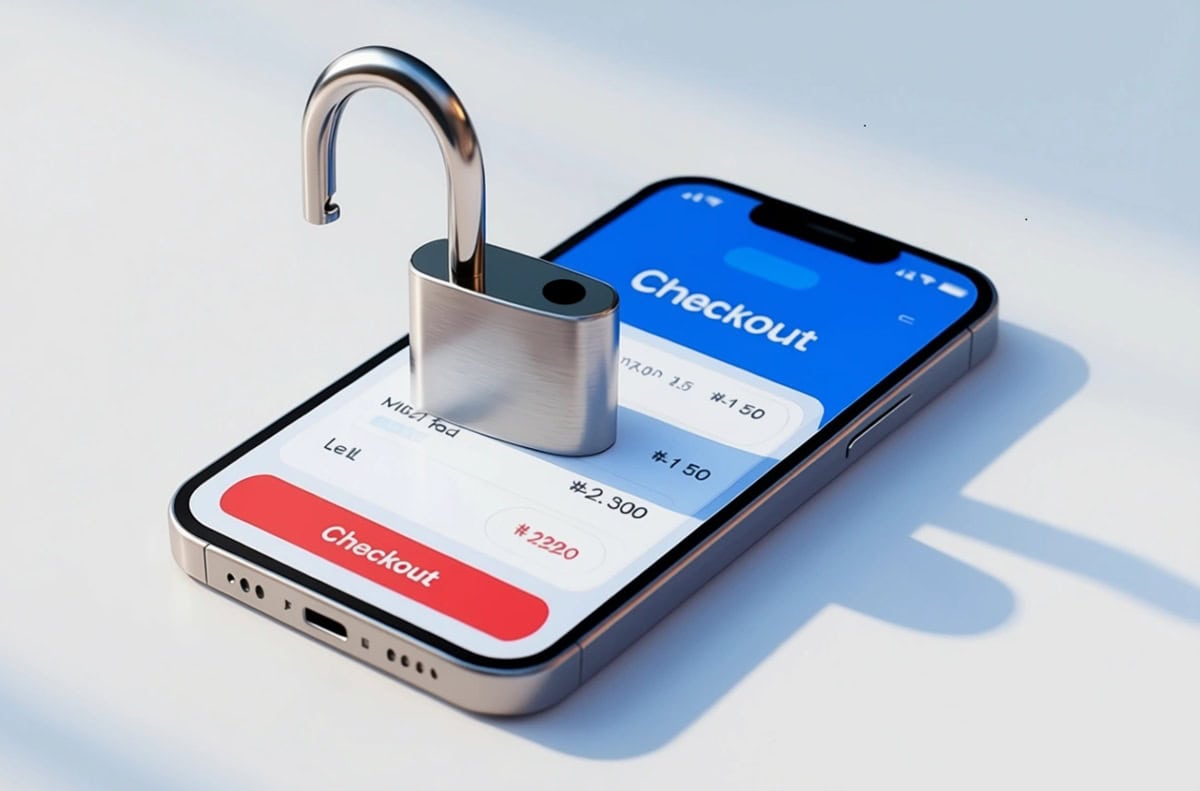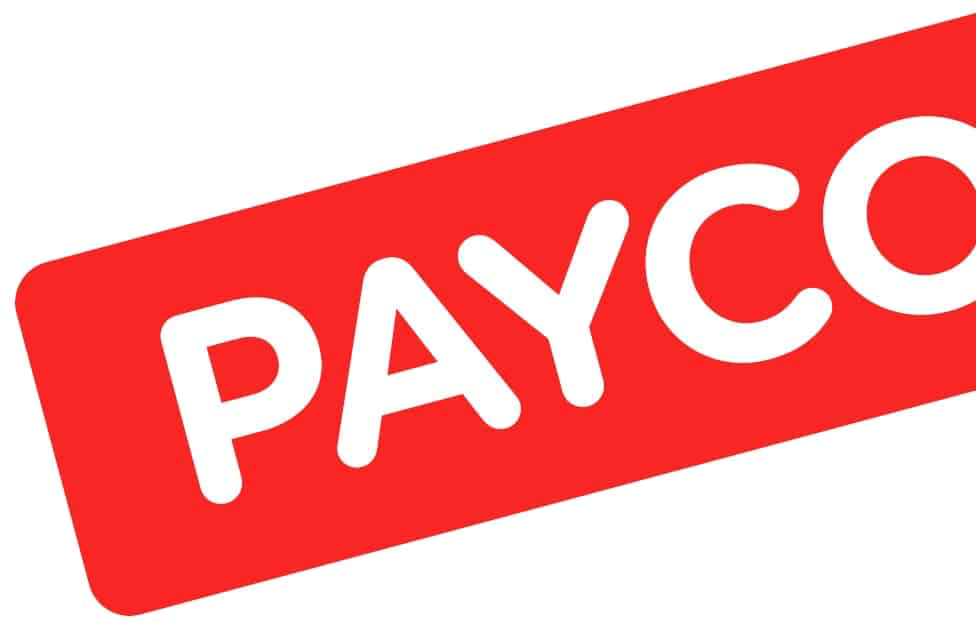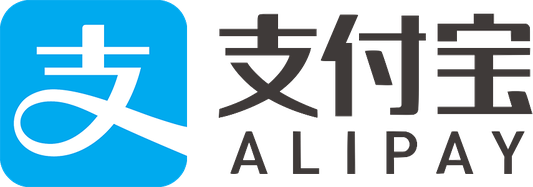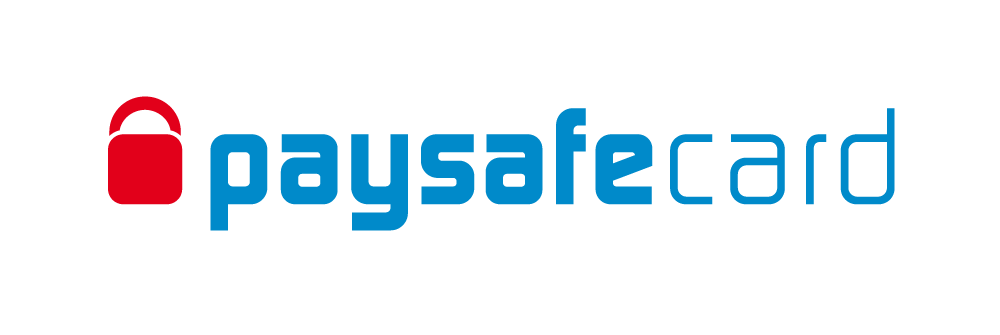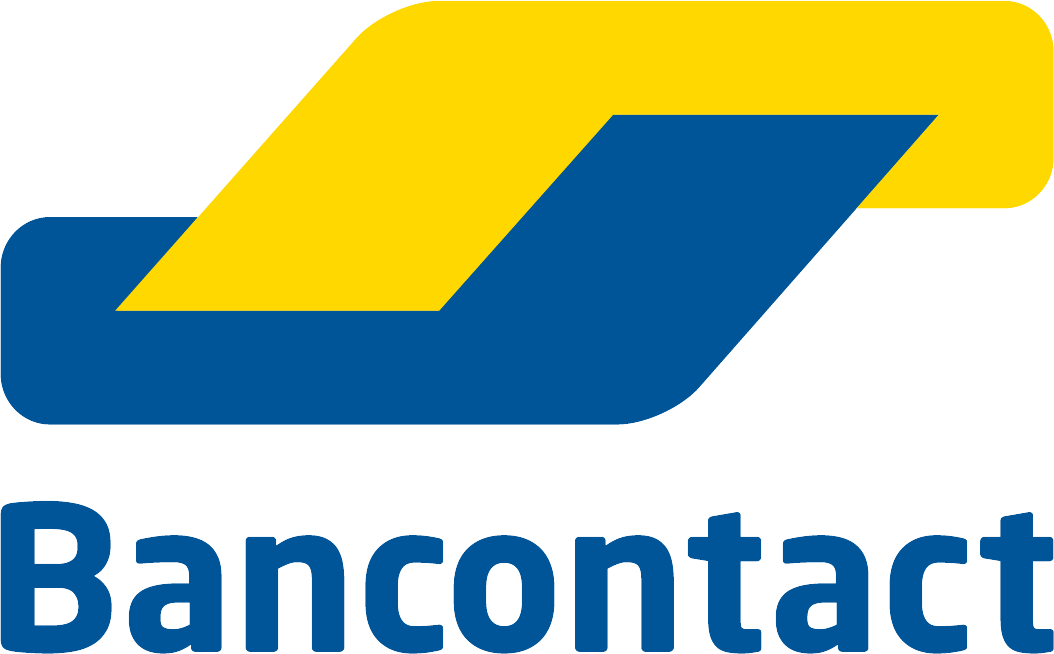
We help businesses accept payments online.
Japan is the third-largest video gaming market globally, trailing only the US and China, and continues to grow in both scale and technology. With approximately 75 million players (more than half the country’s population) and a strong average revenue per paying user (ARPPU) of $19 USD, as per MOLOCO, Japan is both lucrative and somewhat complicated for global video gaming and digital content companies.
Success hinges on more than just localizing your video game, app, or platform. Japan enforces strict regulations around digital payments, particularly regarding in‑game currencies, digital wallets, and monetization in mobile and online video games.
KOMOJU, a licensed Japanese payment gateway, enables businesses to seamlessly accept local payment methods – including Credit Cards,Digital Wallets, Prepaid Wallets, Konbini (convenience store) payments, – while handling the legal and compliance hurdles that come with operating in Japan.
In this article, we’ll explain the payment challenges video gaming and digital content companies face in Japan and how businesses like Steam and others use platforms like KOMOJU to stay compliant, build customer trust, and maximize revenue in one of the world’s most demanding markets.
Note: This article does not constitute legal advice. For regulatory and legal support, consult a qualified professional or legal advisor familiar with Japanese law.
Legal Framework For Video Game Companies Selling in Japan
Japan has strict regulations around how digital content (including in-game currencies and bonus items) can be sold and promoted. In particular, two main laws affect how video gaming businesses operate in Japan:
- The Payment Settlement Act (資金決済法, Shikin Kessai Ho), also commonly translated as the Funds Settlement Act in English, governs prepaid instruments like in-game currency. It imposes legal obligations such as security deposits, financial reporting, and disclosure requirements for companies that issue or manage prepaid balances.
- The Act Against Unjustifiable Premiums and Misleading Representations (景品表示法, Keihin Hyoji Ho) regulates promotional campaigns, prize giveaways, drop-rate disclosures, and advertising practices. It sets clear limits on what can be offered to users and how in-game offers must be presented.
Together, these laws ensure that users are protected, promotions remain fair, and businesses operate transparently, making early compliance a critical part of launching or scaling in Japan’s video gaming market.
If you don’t plan for compliance, it can directly impact how – and whether – you operate in Japan. Just modest in-game sales, unclear item descriptions, misrepresented drop rates, or promotional rewards that exceed legal limits can trigger enforcement measures, public warnings, and fines. Moreover, all official filings and compliance materials must be submitted in Japanese, making the process especially bureaucratic for foreign teams without local expertise.
Legal Obligations for Digital Sales (and beyond) in Japan
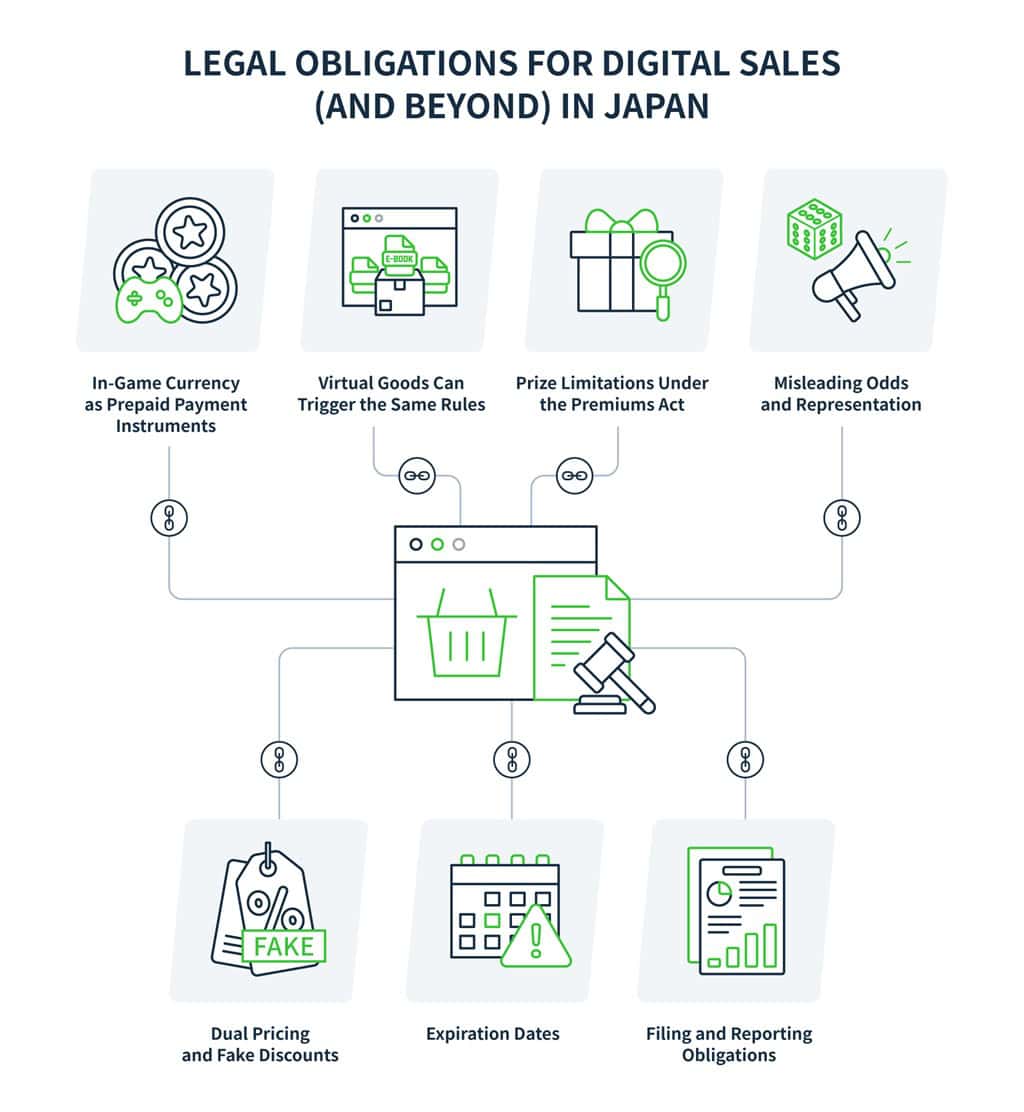
Selling digital goods in Japan, like in-game currency, loot boxes, or limited-time bundles, requires following strict consumer protection laws. These rules aren’t just theoretical: they’ve led to real investigations, fines, and public enforcement orders across the video gaming and tech industries. Below are the key regulations developers need to understand, plus high-profile examples of what happens when companies get it wrong.
In-Game Currency as Prepaid Payment Instruments
Under Article 3 of the Payment Services Act, an in-game currency that users pay for and redeem for items is classified as a “Prepaid Payment Instrument.” Once the total unused balance exceeds ¥10 million by an official reporting date (March 31 or September 30), you’re legally required to register, file reports, and deposit half that amount as a consumer protection measure.
For example, if 100,000 players each hold ¥100 in unspent currency, your business crosses the threshold. This applies even if the currency can’t be converted back into real money.
In 2016, LINE Corporation was found in violation of Japan’s fund settlement law for failing to report and secure large sums of unclaimed deposits linked to in-game payment tokens. The case centered on LINE Pop, a popular puzzle video game with over 40 million downloads, which featured a paid item called the “treasure chest key.” Regulators classified the key as a prepaid payment instrument, triggering legal obligations that LINE had not fulfilled. The company faced a ¥12.5 billion deposit shortfall and was required to cover the amount and overhaul its reporting procedures.
Virtual Goods Can Trigger the Same Rules
Items or features bought using in-game currency, like special keys, boosters, or randomized loot boxes, are often treated as prepaid instruments under Japanese law if they meet specific value and usage criteria, including being purchased with real-money equivalents, having functionality or persistent value in-game, or enabling access to monetized features.
While the law doesn’t automatically apply to all secondary content, once a feature can be linked to a paid currency and provides in-game value, it may legally qualify. Even if these items are one step removed from direct offline cash purchases, they can still fall under the same obligations.
Prize Limitations Under the Premiums Act
The Act Against Unjustifiable Premiums and Misleading Representations limits the value of gifts, bonuses, or rare characters given with purchases. For example, if a player spends ¥2,000 and receives a bonus item, the value of that item must be less than ¥400.
Even if the reward has no resale value, it’s considered an “economic benefit” under the law. Complete gacha (where users combine items to get something new) is outright banned regardless of prize value.
In 2012, video game companies DeNA and GREE were investigated for implementing complete gacha mechanics. These systems required users to collect a set of items (usually through paid random draws) to unlock a bonus reward. The Consumer Affairs Agency ruled the practice illegal and forced the companies to discontinue the feature. It marked a major turning point in industry self-regulation and increased government scrutiny.
In 2021, the Consumer Affairs Agency issued a regulatory measure order to developers Square Enix and Gumi for violating the Premiums Act with a misleading “10x Summon” campaign in their mobile titles Final Fantasy Brave Exvius and War of the Visions. The campaign failed to adequately disclose the lottery mechanics, leading to official warnings and public notice. Even major Japanese companies are not exempt from compliance scrutiny.
Misleading Odds and Representation
Advertising or UI that exaggerates drop rates or item strength isn’t just dishonest – it’s strictly regulated. For example, if your video game advertises a 3% chance to get a rare item, but the actual rate is lower, that’s a violation.
In 2018, Japan’s Consumer Affairs Agency took regulatory action against the operator of The King of Fighters ’98 ULTIMATE MATCH Online. The video game displayed a 3% appearance rate for a rare character in gacha, but the real probability was just 0.333%. Only one of ten gacha pulls had the boosted rate; the other nine retained the lower odds, misleading users.
This deceptive practice violated Article 5-2 of the Premiums Act, resulting in a public enforcement order and a ¥6.09 million surcharge, calculated as 3% of the campaign’s sales.
Dual Pricing and Fake Discounts
If your video game advertises “normally ¥1,000, now ¥100,” that “normal” price must be genuine. Japan’s Act Against Unjustifiable Premiums and Misleading Representations prohibits misleading markdowns. According to Japan Fair Trade Commission (JFTC) guidelines, the original price can only be referenced if:
- The item was sold at that price for more than half of the previous 8 weeks and
- No more than 2 weeks have passed since it was last offered at that price
Displays that fail to meet these conditions are considered deceptive. In 2024, Fujitsu Client Computing Limited was fined ¥42.23 million after advertising laptops with inflated “web prices” that had never been used. The laptops continued to be sold at the “campaign price” even after the promotion ended. This was ruled a dual pricing violation, and the company received a cease-and-desist order and financial penalty.
Comparable promotional language in video games (such as “50% off” item bundles) may be subject to the same scrutiny if the pricing history cannot be substantiated.
Expiration Dates
To reduce regulatory burden, many developers set expiration periods (often 180 days) for in-game currency purchased by users. Under Article 4 of the Payment Services Act, prepaid balances that expire within six months are exempt from registration and specific financial reporting requirements.
This strategy is legal and widely used, but only when users are clearly informed in advance. Article 13 of the same Act mandates that businesses disclose expiration terms and usage conditions before purchase.
A related example comes from Japan’s prepaid card market.
For example, the Rakuten Point Gift Card clearly states:
“The validity period of the Rakuten Super Points earned with this card is 6 months from the date of purchase.”
This practice complies with Japanese law by setting expectations up front and preventing confusion or disputes. The same logic applies to digital video games, especially since minors often buy currency using prepaid cards. If players aren’t made fully aware of expiration conditions, complaints and reputational damage can follow, even when the system itself is legal.
Filing and Reporting Obligations
Once the total unspent in-game currency held by users exceeds ¥10 million, your company is required to follow specific legal procedures under the Payment Services Act.
These include:
- Notifying the Local Finance Bureau
- Submitting regular financial reports
- Securing funds by depositing 50% of outstanding balances
- Publishing Japanese-language disclosures for users
Non-compliance can lead to audits, administrative warnings, or forced suspension of services. Even when operating through a Japanese subsidiary, companies may face heightened scrutiny if compliance gaps are found.
In 2022, Japan’s Financial Services Agency released updated supervisory guidelines clarifying that foreign companies issuing prepaid instruments in Japan are subject to the same legal obligations as domestic firms. These include deposit requirements, financial reporting, and mandatory Japanese-language disclosures. The guidance made clear that no regulatory exemptions apply based on a company’s country of origin.
How Komoju Can Help
KOMOJU is a global payment gateway built in Japan, designed specifically to help international businesses localize their payment experiences and meet regulatory requirements without building everything in-house. It supports both digital and physical merchants, with a strong focus on video gaming, eCommerce, and subscription services.
For foreign developers and publishers, Japan’s payment ecosystem presents unique challenges: strict compliance laws, mandatory financial disclosures in Japanese, and local payment preferences. KOMOJU addresses this head-on by offering a turnkey infrastructure for payment processing and legal compliance.
What KOMOJU Does
Companies that integrate with KOMOJU can instantly access a fully compliant payment environment rather than navigate Japan’s bureaucratic regulatory system alone.
- Local Payment Acceptance: Accept Japan’s most trusted methods, including credit cards, digital wallets, prepaid cards, convenience store payments, carrier billing, and more, without needing direct contracts with each provider.
- Compliance Service: KOMOJU handles critical legal tasks on your behalf, including licensing, fund deposits, and regular financial reporting as required under Japan’s Payment Services Act.
- Built-In Security and Certification: With support for 3D Secure 2.0 and PCI DSS compliance, businesses can meet industry standards and demonstrate security and certification to customers.
Why KOMOJU Works for Video Gaming Companies
Gaming and content platforms often monetize through in-game purchases, subscriptions, or prepaid currency. Each of these can trigger legal thresholds under Japan’s laws.
KOMOJU simplifies this by:
- Providing real-time monitoring of fund balances
- Ensuring disclosures meet Japanese-language legal standards
- Offering support from compliance professionals familiar with video gaming-specific challenges
With multilingual onboarding, robust API documentation, and live support from Japan-based experts, KOMOJU reduces the complexity and compliance risks that prevent many businesses from entering this high-value market for video gaming and digital goods.
Steam’s Japan Strategy: Local Payments and KOMOJU
Steam, one of the world’s largest PC video gaming platforms, faced a complex challenge when expanding in Japan: how to offer local payment methods while complying with strict financial laws. Instead of building its own infrastructure, Steam integrated with KOMOJU.
KOMOJU was one of the first platforms to power Steam in Japan and S. Korea. It now supports Steam Deck purchases and other titles across Japan, S. Korea, Hong Kong, and Taiwan. Through KOMOJU, Steam was able to:
- Accept local payments, including prepaid cards – a vital channel for younger video gamers in Japan. A 2020–2023 consumer payments survey reported that 16–19% of users aged 16–29 in Japan regularly use prepaid cards for shopping and digital purchases, including platforms like Steam. Japan’s prepaid and digital wallet market is projected to grow to USD 626 billion by 2032.
- Comply with Japan’s Fund Settlement Law by outsourcing deposits, reporting, and disclosures.
- Introduce wallet credit expiration policies to reduce financial liability.
- Publish mandatory user notices and refund policies in Japanese.
KOMOJU allowed Steam to focus on product and user experience while meeting Japan’s legal standards. This model has since been replicated by other global publishers looking to enter Japan and broader APAC markets. This partnership extended further with Valve’s Steam Deck APAC launch. KOMOJU handled payment solutions across the region, enabling seamless transactions for customers in Japan, S. Korea, Hong Kong, and Taiwan.
Steam currently has over 132 million monthly active users globally, with Japanese-language users making up 2.82% of the total as of June 2023, equivalent to nearly 3.7 million users in Japan. With a library of over 100,000 video games, Steam’s footprint in Japan shows that success in this market depends on more than content – it also depends on payment localization and compliance with Japanese law, both of which KOMOJU helped deliver behind the scenes.
Summary
Japan remains one of the most lucrative but tightly regulated markets for video gaming and digital content. For developers and businesses to be successful in Japan, success demands a deep understanding of local payment preferences and strict adherence to regulatory requirements.
Japanese users expect a seamless and familiar payment experience. While credit cards still dominate, mobile wallets like PayPay and other forms of e-money are increasingly standard. At the same time, convenience store payments (Konbini pay) and prepaid cards remain essential, particularly among underbanked users and younger demographics aged 16–29, who represent a significant portion of Japan’s digital video gaming spend.
From a compliance perspective, even major players like LINE and Fujitsu have faced penalties for failing to meet obligations under Japan’s Payment Services Act and related consumer protection laws. Common pitfalls include not registering prepaid balances exceeding ¥10 million, missing deposit and financial reporting deadlines, and failing to disclose expiration dates or comply with promotional restrictions under the Premiums Act. Additionally, legal notices, refund policies, and user terms must be presented in Japanese – noncompliance can lead to fines, audits, or service suspensions.
Partnering early with a Japanese payment service provider like KOMOJU can streamline this process by handling licensing, compliance reporting, disclosures, and secure payment processing.
In short, thriving in Japan’s digital market means aligning your business not only with player expectations but also with one of the world’s most exacting regulatory environments. Companies that localize both their product and their payment infrastructure are best positioned for sustainable growth.
FAQ
No, but there are conditions. You don’t need a Japanese entity just to sell digital content. However, if you issue prepaid balances (e.g., in-game currency or stored value) and the total unused balance exceeds ¥10 million on a reporting date (March 31 or September 30), you must:
- File a notification under the Payment Services Act and
- Deposit at least 50% of the outstanding balance as a safeguard for users.
To do this, you’ll need a Japanese legal representative or partner with a local payment service provider, such as KOMOJU. Foreign entities cannot register to issue open-loop prepaid instruments without a branch office in Japan.
Yes, if you’re targeting Japanese consumers. Under Japanese consumer laws, terms of service, refund and cancellation policies, pricing disclosures, and user notifications must be clear and understandable. That means they should be provided in Japanese. Poor or missing translations may also render contract clauses unenforceable or misleading.
In the realm of video gaming and digital content, it refers to items like in-game currency or digital credits/tokens. Under the Payment Services Act, a “prepaid payment instrument” includes any paid digital currency or credit that:
- is issued in exchange for money,
- is stored by the user, and
- can be redeemed for goods or services.
Yes, and they’re strictly enforced. Under the Act Against Unjustifiable Premiums, digital promotions must follow these rules:
- Bonus value cannot exceed 20% of the transaction amount (or ¥200 for small purchases).
- “Complete gacha” is banned: You cannot offer rare rewards that require collecting a complete set of random items.
- Fake discounts (e.g., inflated “original prices”) are considered misleading and can result in fines and public correction orders.
Yes, but you’re still legally responsible. Selling through Steam, Shopify, or any global platform does not exempt you from Japanese law. You remain responsible for compliance with the law, providing Japanese-language disclosures, and ensuring payment methods are localized.
You may outsource infrastructure to a platform or payment service provider, but legal liability remains with you as the content provider.

We help businesses accept payments online.

